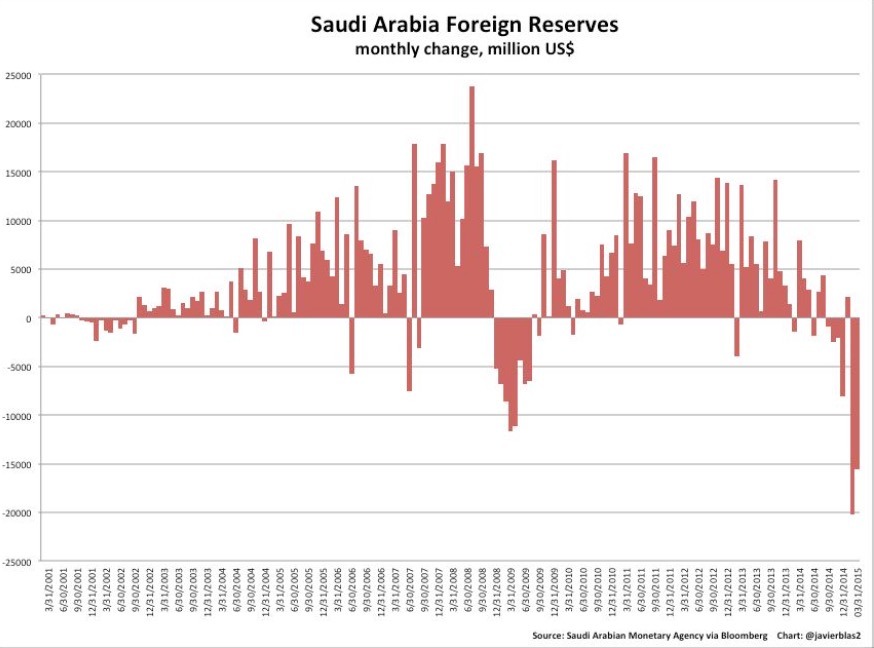
A 4 a.m. communique from Riyadh on Wednesday detailed one of the most momentous political shake-ups in the history of Saudi Arabia. King Salman, who took office in January, in a stroke transferred power to a new generation, offered appeasement to the kingdom’s religious conservatives, reinforced his regime’s pro-American and anti-Iranian character, and underlined its intention to act boldly both at home and abroad.
These developments would be more encouraging if they were accompanied by signs the new leaders were likely to accelerate the glacial movement by the previous king, Abdullah, toward a more inclusive political system and increased civil rights, including for women. Unfortunately, the signs point to the opposite. King Salman has already taken steps to appease religious conservatives, including restoring power to the reactionary religious police. Last week’s reshuffling ousted the only female member of the cabinet, a deputy education minister.
– From the Washington Post article: Shake-up in the House of Saud
Unless you’ve been living under a geopolitical rock for the past several months, you’ll be aware that Saudi Arabia has a new king. Specifically, Salman bin Abdulaziz Al Saud, was crowned the head monarch on January 23, 2015 following the death of the prior king. If you were hoping to see a pivot away from medieval cruelty, oppression and general societal backwardness you’ll be sorely disappointed.
Although Salman immediately reshuffled the cabinet following his succession, it’s his more recent maneuverings that have caught the attention of many. Specifically, he appointed his nephew, and 55-year-old Interior Minister Mohammed bin Nayef, as new heir-presumptive, while naming Mohammed bin Salman, as deputy crown prince, or second in line to rule.
So who are Mohammed bin Nayef and Mohammed bin Salman? It’s important since they are the presumptive future leaders of the Kingdom. In paragraphs that read like a script from Game of Thrones, The Washington Post gives us some answers:
A 4 A.M. COMMUNIQUE from Riyadh on Wednesday detailed one of the most momentous political shake-ups in the history of Saudi Arabia. King Salman, who took office in January, in a stroke transferred power to a new generation, offered appeasement to the kingdom’s religious conservatives, reinforced his regime’s pro-American and anti-Iranian character, and underlined its intention to act boldly both at home and abroad. For the legions of analysts who have fretted that the Saudi dynasty was crumbling as its rulers aged, it was a strong corrective. But for those who have hoped to see a gradual liberalization of the Arab world’s most influential monarchy, the news was mixed at best.
U.S. officials could only be pleased that King Salman, who is 79 and in uncertain health, chose to shove aside the crown prince named by his predecessor in favor of 55-year-old Interior Minister Mohammed bin Nayef, who has worked closely with Washington on counterterrorism campaigns. Equally popular in D.C. precincts is Adel al Jubeir, 53, the U.S.-educated ambassador to Washington who was promoted to the post of foreign minister. The king meanwhile installed his favorite son, Mohammed bin Salman, as deputy crown prince, placing a prince in his early 30s in the line of succession.
These developments would be more encouraging if they were accompanied by signs the new leaders were likely to accelerate the glacial movement by the previous king, Abdullah, toward a more inclusive political system and increased civil rights, including for women. Unfortunately, the signs point to the opposite. King Salman has already taken steps to appease religious conservatives, including restoring power to the reactionary religious police. Last week’s reshuffling ousted the only female member of the cabinet, a deputy education minister.
Though admired by U.S. spies and generals, Prince Nayef has waged war against liberal reformers as well as terrorists. As Adam Coogle of Human Rights Watch put it, his interior ministry “has carried out a sweeping crackdown on peaceful dissent, using its powers to intimidate, detain, and imprison anyone who dares to criticize the government or call for serious reforms.”
Gotta love how liberal reformers are lumped in with “terrorists.” Nayef is first in line to be the next king, but the new king’s son might be even worse. He is the “mastermind” behind the total failure that is the Yemen campaign.
The most aggressive — and reckless — actions of the Salman regime, however, have come under the command of the new heir apparent. As defense minister, Mohammed bin Salman is the face of the Saudi intervention in Yemen, a bombing campaign that so far has killed hundreds of civilians but failed to stop the advance of the Iranian-supplied Houthi forces. He can be linked, too, to a new Saudi initiative to support Syrian rebels in concert with Turkey.
As mentioned above, the king’s son, and newly minted deputy crown prince, has been the “mastermind” behind the pointless, civilian killing spree known as the Yemen bombing campaign. As the New York Times noted recently:
But the air campaign has killed scores of civilians and earned derision from critics in Yemen and abroad who have called it strategically incoherent for failing to either dislodge the Houthis and their allies or to force them to negotiate.
More than 1,000 people have been killed over the past month, including at least 500 civilians, according to the United Nations. Hundreds of people have been killed in Aden, Yemen’s second largest city, which has been devastated by factional street fighting for more than a month.
So at least 50% of the people killed have been civilians. Brilliant way to handle a crisis — create a bigger one.
In fact, the Yemen campaign is such an abject failure, Hezbollah’s leader is relishing in it and talking an tremendous amount of trash in the process. Israeli paper Haaretz reports:
Hezbollah leader Hassan Nasrallah slammed Saudi Arabia on Monday for its role in the conflict in Yemen, saying its “aggressions” have failed to achieve any of their objectives.
“The war being raged against Yemen by Saudi Arabia and its allies has achieved nothing whatsoever,” Nasrallah said in a televised speech, claiming the Saudis were looking for a way to back out of the conflict.
“Show me one objective that has been achieved so far,” Nasrallah said, adding that it was a “blatant Saudi failure and defeat” and a “clear victory for the Yemeni people.”
Oh, and to make matters worse, it appears the conflict has now creeped into Saudi territory:
Yemen’s Shiite rebels fired rockets and mortars into Saudi Arabia on Tuesday, killing at least two civilians and reportedly capturing five soldiers in an attack showing the insurgents’ ability to launch assaults despite weeks of airstrikes targeting them.
So while the Saudis have achieved nothing but escalate the conflict and murder civilians, they’ve spent an incredible amount of money doing it. Bloomberg reports that:
Saudi Arabia is burning through foreign reserves at a record pace as the largesse of the new king and regional turmoil ratchet up pressure on public finances already hurt by the oil price slump.
The kingdom spent $36 billion of the central bank’s net foreign assets — about 5 percent of the total — in February and March, the biggest two-month drop on record, data released this week show. The fall was in part due to King Salman’s order to give government employees and pensioners a two-month bonus after he ascended to the throne of the world’s biggest oil exporter in January.
Malik expects the budget deficit to widen to 14.5 percent of gross domestic product this year, compared with a gap of 1.9 percent in 2014. The king’s handouts are likely to boost domestic consumption, supporting non-oil economic growth, she said.
While the new Saudi king thinks he’s solidifying his power internally and externally, the Kingdom seems to be more vulnerable now than ever. In contrast, Iran seems to be stronger than ever, and I suspect it will supersede Saudi Arabia within the region a lot sooner than people recognize. Particularly if the Saudis continue along their recent senseless course, and all indications are that they will.
For related articles, see:
Record Beheadings and the Mass Arrest of Christians – Is it ISIS? No it’s Saudi Arabia
The New York Post Reports – FBI is Covering Up Saudi Links to 9/11 Attack
Already 45 Beheadings in 2015 – Saudi Arabia on Pace to Easily Beat 2014’s Decapitation Level
Saudi Arabia Sentences 3 Lawyers to Jail for Tweets
In Liberty,



